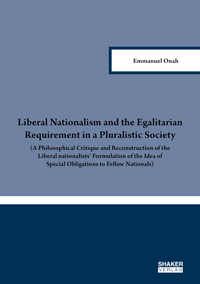
Shop : Details
Shop
Details
49,80 €ISBN 978-3-8440-8555-6Softcover298 pages444 g21 x 14,8 cmEnglishThesis
April 2022
Emmanuel Onah
Liberal Nationalism and the Egalitarian Requirement in a Pluralistic Society
(A Philosophical Critique and Reconstruction of the Liberal nationalists' Formulation of the Idea of Special Obligations to Fellow Nationals)
In order to ensure the stability of and justice in a contemporary state, the diversity that characterises the state is to be correctly approached. This entails the exclusion of two forms of attitudes. The first attitude is the denial of the diversity. The second is a recognition of the diversity that merely serves the aim of making differences the basis of ascribing burdens and benefits. In this light, any social political theory that defends a view that a cultural conception of nation offers genuine ground for preferential treatment fails to offer a valid guide to action in the contemporary society where virtually every state has members that consist of people with divers (culturally defined) national identities. This work shows how this is the case and offers a valid alternative.
Keywords: Liberalism; nationalism; nation; special obligations; multinational states
Available online documents for this title
You need Adobe Reader, to view these files. Here you will find a little help and information for downloading the PDF files.
Please note that the online documents cannot be printed or edited.
Please also see further information at: Help and Information.
Please also see further information at: Help and Information.
| Document |  | Document | ||
| Type |  | |||
| Costs |  | 37,35 € | ||
| Action |  | Purchase in obligation and download the file | ||
| Document |  | Table of contents | ||
| Type |  | |||
| Costs |  | free | ||
| Action |  | Download the file | ||
User settings for registered online customers (online documents)
You can change your address details here and access documents you have already ordered.
User
Not logged in
Export of bibliographic data
Shaker Verlag GmbH
Am Langen Graben 15a
52353 Düren
Germany
Am Langen Graben 15a
52353 Düren
Germany
Mon. - Thurs. 8:00 a.m. to 4:00 p.m.
Fri. 8:00 a.m. to 3:00 p.m.
Fri. 8:00 a.m. to 3:00 p.m.
Contact us. We will be happy to help you.



